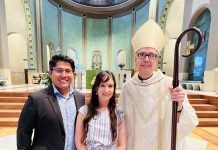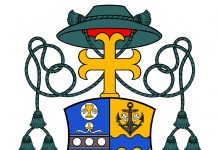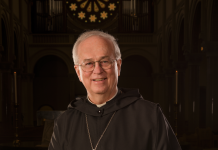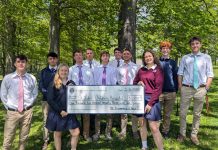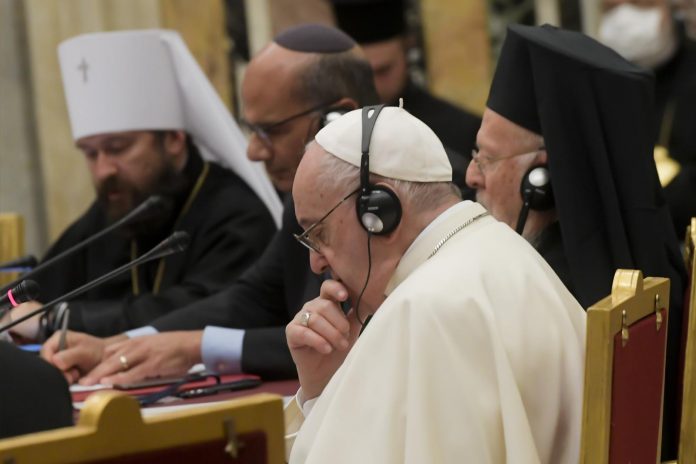
By Carol Glatz
VATICAN CITY (CNS) — A former educator himself, Pope Francis and other religious leaders helped celebrate World Teachers’ Day by promoting a global alliance aimed at creating an “open and inclusive” education for everyone.
The representatives of different religions thanked the world’s teachers “for your dedication and sacrifice as you carry out the noble mission of educating young people. And we wish to encourage you to continue on your journey, despite the difficulties and challenges of our time, which have been exacerbated by the pandemic,” they said in a joint message Oct. 5.
They called on government leaders to hold the teaching profession in high esteem, including by guaranteeing fair pay, creating better working conditions and offering assistance in continuing education for teachers.
“We hope that each nation will give due value and recognition to your service, in the knowledge that the future of humanity depends on the quality of teachers and educators,” the representatives said.
The written message came at the conclusion of a one-day meeting at the Vatican, “Religions and Education: Toward a Global Compact on Education.”
In his talk to those present, Pope Francis said he launched the Global Compact on Education to invite everyone “to unite our efforts in a broad educational alliance, to form mature individuals capable of overcoming division and antagonism, and to restore the fabric of relationships for the sake of a more fraternal humanity.”
An “integral” education helps people to better know themselves, others, creation and the transcendent, he said, and as leaders of different faiths, “we cannot fail to speak to young people about the truths that give meaning to life.”
“Religions have always had a close relationship with education,” he said, encouraging each religious tradition to “advance universal fraternity in our world.”
Today, religions can see their differences not as a reason for conflict, but as a reflection of “the richness of different ways of coming to God and of educating young people for peaceful coexistence in mutual respect,” he said.
“For this reason, education commits us never to use God’s name to justify violence and hatred toward other religious traditions, to condemn all forms of fanaticism and fundamentalism, and to defend the right of each individual to choose and act in accordance with his or her conscience,” he said.
While religion has been used in the past to justify discrimination, “today we want to be defenders of the identity and dignity of every individual and to teach young people to accept everyone without discrimination,” the pope said. “For this reason, education commits us to accept people as they are, not how we want them to be, without judging or condemning anyone.”
“If in the past, the rights of women, children and the most vulnerable were not always respected, today we are committed firmly to defend those rights and to teach young people to be a voice for the voiceless,” he said, calling on religious leaders “to reject and denounce every violation of the physical and moral integrity of each individual. Education must make us realize that men and women are equal in dignity; there is no room for discrimination.”
Pope Francis launched the global compact in September 2019 to promote a deeper and more widespread commitment to working with young people and “renewing our passion for a more open and inclusive education, including patient listening, constructive dialogue and better mutual understanding,” he said at its launch.
While the COVID-19 pandemic forced the cancellation of the May 2020 meeting in Rome to promote the alliance, work continued on the local level and through the Vatican Congregation for Catholic Education, which has published a number of resources for educators online at educationglobalcompact.org.
The Oct. 5 meeting was meant to bring representatives of the world’s religions together to highlight their experience and work in education, to detail current challenges and reaffirm the importance of a holistic education aimed at creating more just, peaceful, fraternal and service-oriented communities.
Nearly 20 representatives of the world’s different faiths were present, many of whom had been at the Vatican Oct. 4 pledging to promote sustainable lifestyles, ecological education and public policies to mitigate the effects of climate change ahead of the COP26 meeting in November.
In their joint message, the religious representatives asked teachers and educators to continue to serve young people and to not hesitate to look to their faith for support.
An education that is open and inclusive empowers individuals and families, especially the most vulnerable and marginalized, it said. A holistic education passes on more than information as it nurtures curiosity and a sense of people’s ethical duty to each other and to all life.


